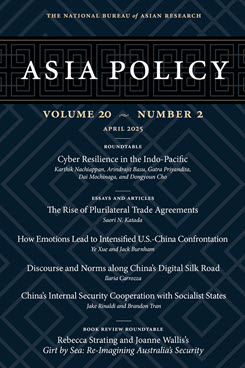Article in Asia Policy 20.2
Convergence Fuels Divergence: How Emotions Lead to Intensified U.S.-China Confrontation
This article examines the role of emotion in the U.S. and China as a key factor in the steady deterioration of their bilateral relationship.
Executive Summary
MAIN ARGUMENT
The U.S.-China relationship has experienced a well-documented downward spiral since approximately 2017, marked by rising tensions and conflicts across various domains. While some studies attribute this prolonged tension to a widening divergence in national interests, political ideologies, and government systems, a significant yet often overlooked factor is the convergence of their emotional states. Both countries exhibit an “confidence-anxiety complex.” Anxiety reflects a pessimistic view of the future, prompting defensive, short-term action, while confidence stems from a belief in the capacity to overcome challenges, encouraging more assertive behavior. The interplay of these two emotions has intensified confrontational tendencies, as confidence leads both nations to pursue short-term goals driven by underlying anxieties. Consequently, their conflict has become increasingly symbolic and difficult to resolve.
POLICY IMPLICATIONS
- The confidence-anxiety complex will continue to shape U.S.-China relations. In China, emotional narratives combining anxiety and confidence support domestic legitimacy and influence responses to the U.S. In the U.S., Donald Trump’s re-election reflects persistent societal anxiety, while enduring narratives of hegemony and confidence influence policies on China and perpetuate strained relations.
- To manage escalating U.S.-China tensions, both governments should prioritize high-level communication and backchannel diplomacy to reduce emotional distractions and mitigate performative rhetoric. Establishing quasi-official channels could help moderate conflicts. People-to-people exchanges are best depoliticized, with the U.S. avoiding restrictive policies on academic collaboration and China promoting balanced public attitudes.
- To restore U.S.-China relations more thoroughly, both nations should recalibrate their identity narratives. China could soften its rhetoric by emphasizing “remembering history, not hatred,” while the U.S. could downplay populism and the dichotomous framing of democracy and authoritarianism. Shifting from competitive to mutual empowerment narratives while fostering public dialogue could transform zero-sum dynamics into engagement, encouraging reassurance and future cooperation.
Ye Xue is a Research Fellow with the China Institute at the University of Alberta (Canada) and a Nonresident Fellow with the China Studies Centre at the University of Sydney.
Jack Burnham is a Research Analyst at the Foundation for Defense of Democracies (United States). He was previously a Senior Policy Research Analyst with the China Institute at the University of Alberta. Mr. Burnham’s professional background is in security and defense studies, and he has previously written for the NATO Association of Canada, the Institute for Research on Public Policy, the Centre for International and Defence Policy, the SOAS China Institute Blog, and the Conversation.
About Asia Policy
Asia Policy is a peer-reviewed scholarly journal presenting policy-relevant academic research on the Asia-Pacific that draws clear and concise conclusions useful to today’s policymakers. Asia Policy is published quarterly in January, April, July, and October and accepts submissions on a rolling basis. Learn more


